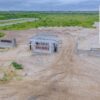Lagos State, Nigeria’s bustling commercial hub, has experienced notable shifts in its real estate sector over the past year. A recent report from Estate Intel, a leading real estate research and data firm, sheds light on the challenges and opportunities within this dynamic market. The 2024 Lagos Real Estate Development Pipeline Report provides a detailed analysis of the various sectors within Lagos’ commercial real estate market, revealing key trends and insights that stakeholders should consider as they navigate the year ahead.
Decline in Commercial Real Estate Development
One of the most significant takeaways from the report is the 11% year-on-year (YoY) decline in commercial real estate development activity across Lagos State. This downturn is largely attributed to Nigeria’s ongoing economic challenges, including record-high inflation and a weakening currency. These factors have created a cautious atmosphere among developers and investors, leading to a slowdown in construction activities.
Despite the overall decline, the office sector has shown a glimmer of resilience. The report highlights a slight increase in the development pipeline for office spaces, which now account for 16.25% of total stock, up from 14% in 2022. This uptick is primarily driven by projects nearing completion, which are expected to impact occupancy rates, especially in prime areas like Ikoyi and Victoria Island. By 2025, these key nodes are expected to account for 75% of the new office space supply.
The Office Market: Adapting to Economic Headwinds
The Lagos office market is facing significant macroeconomic challenges, with rents remaining subdued as landlords offer concessions to maintain occupancy levels. Companies are increasingly opting to downsize or exit the market altogether, impacting occupancy rates. Notably, tech giants like Microsoft and Meta have reduced their occupied space in Kings Tower, reflecting broader trends in the market.
However, the completion of new office projects in high-demand areas may provide some relief. As these developments come online, they could help stabilize occupancy rates in prime locations, although the broader market may continue to face headwinds.
Retail Sector: Resilience Amidst Economic Pressures
The retail sector in Lagos has been relatively subdued, with development activity largely driven by hypermarkets and neighborhood supermarkets. Large-scale retail developments account for 70% of the pipeline, although many of these projects are currently on hold. The 30,000m² Orca Mall is one of the few exceptions, being the only project over 10,000m² actively under construction. This marks the first significant retail development of its size in two years.
Despite the economic pressures, formal retail malls have managed to maintain healthy occupancy rates, averaging 86% as of Q1 2024. However, reduced footfall outside of the festive season suggests that consumer spending is being impacted by the challenging macroeconomic environment.
Hospitality Sector: A Beacon of Growth
In contrast to the broader market challenges, the hospitality sector has emerged as a bright spot in Lagos’ commercial real estate landscape. The sector recorded a 35% increase in Average Daily Rate (ADR) compared to 2022, reflecting strong demand and limited new supply. By the end of 2023, both ADR and Revenue per Available Room (RevPAR) had surpassed pre-pandemic levels, highlighting the sector’s resilience.
Trevor Ward from W Hospitality noted the remarkable recovery and resilience of the Lagos hotel market, which has outperformed many other cities globally in terms of demand and pricing. The limited supply of new hotel developments has allowed operators to increase prices, with little resistance from the market.
Emerging Opportunities in Data Centres and Industrial Real Estate
Data centres continue to attract significant interest from investors, driven by the growing demand for digital infrastructure across Africa. The report predicts that supply will reach 200MW by 2025, making this a key sector to watch in the coming years.
The industrial sector also presents opportunities, particularly as domestic demand drives transaction activity. Despite recent exits by multinational companies, the sector remains resilient, with local demand continuing to support growth.
Addressing Lagos’ Housing Deficit: A Call for Collaboration
The residential sector, particularly the low to middle-income segment, continues to experience strong demand. However, the existing development pipeline of 33,000 units falls significantly short of addressing Lagos’ estimated housing deficit of 2.3 million units. As the government undertakes mass housing projects to bridge this gap, there is a clear opportunity for private developers to collaborate on similar initiatives, such as the Police Housing Scheme.
Dapo Runsewe, Senior Analyst at Estate Intel, emphasized the importance of collaboration between the public and private sectors to meet the growing housing demand. He also highlighted the potential for investment in informal retail, citing the expansion of chains like Prince Ebeano Supermarket and Bokku! Mart as examples of successful ventures in this space.
Conclusion: Navigating the Future of Lagos’ Commercial Real Estate
The 2024 Lagos Real Estate Development Pipeline Report provides valuable insights into the current state of the market and the challenges and opportunities that lie ahead. While economic headwinds continue to impact commercial real estate development, bright spots exist in the hospitality, industrial, and data centre sectors. As stakeholders navigate these changes, strategic collaboration and targeted investments will be key to unlocking the full potential of Lagos’ commercial real estate market in the years to come.




